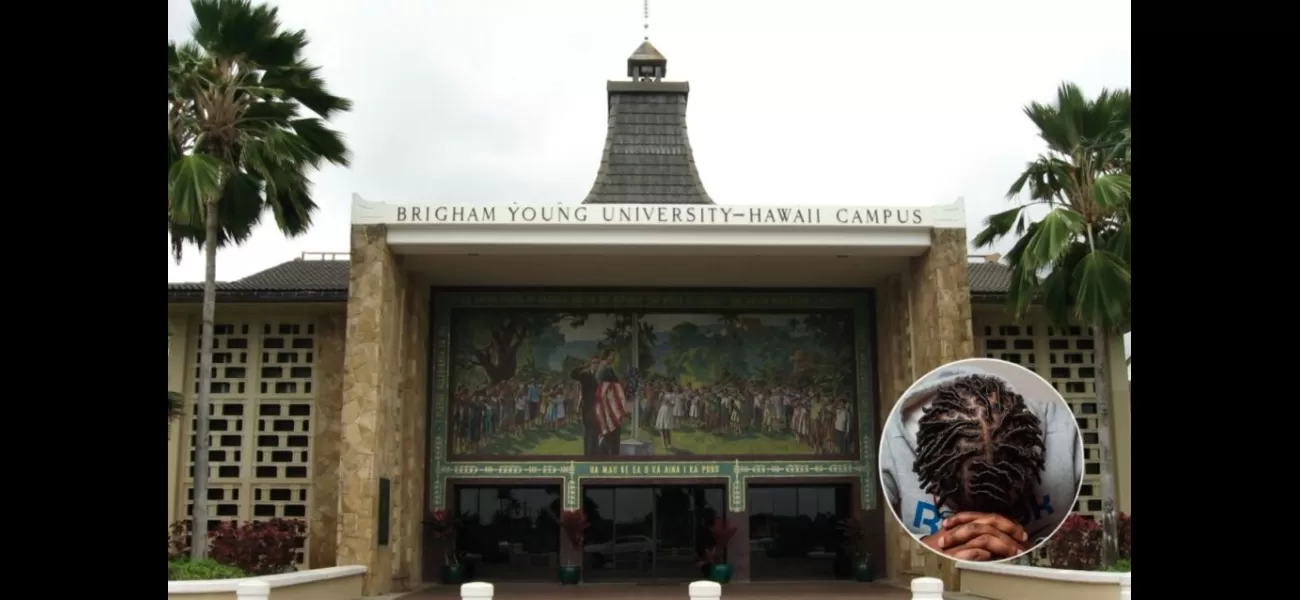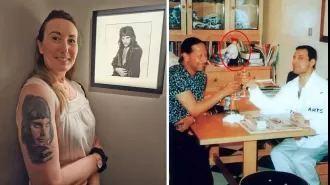A student at Brigham Young University-Hawaii is struggling to maintain his dreadlocks.
A Black student at BYU-Hawaii is in a hair policy dispute over his locs.
March 21st 2024.

Recently, The Guardian published an article about Kanaan VyShonne Barton, a young Black student attending Brigham Young University-Hawaii. Barton has found himself in a dispute with the university over its hair policy, which he believes unfairly targets his shoulder-length locs. As a symbol of his cultural heritage, Barton refuses to cut his hair and has been facing pushback from the school since September.
According to Barton, his locs hold deep personal and cultural significance, representing his identity and ancestry. Despite the school's requirement for "neatly trimmed" hair in its honor code, Barton argues that his locs should be respected and not seen as a violation of the rules. In an interview with the Salt Lake Tribune, Barton asserted, "Regardless of the length of my hair, I am spiritually involved. I am actively going to church. But my locs mean something to me. They are culture. They are family. I shouldn't have to cut my hair to get an education here."
BYU-Hawaii, which is a satellite campus of Brigham Young University, follows a strict honor code that governs various aspects of student behavior, including grooming standards. While the code does mention that hair should be "clean, neat, modest, and avoid extremes in styles and colors," it does not provide specific guidelines on length. This lack of clarity has caused tension between Barton and the university.
In a meeting with Jonathan Kalaonalani Kau, the vice president for student life, Barton claims that Kau instructed him to trim his locs, deeming them a "distraction" and accusing Barton of "pushing his own agenda and being defiant." In an attempt to find a compromise, Barton has started styling his locs in a way that keeps them above his collar. However, he remains firm in his belief that his locs should not be seen as a problem.
For Barton, his locs are more than just a hairstyle. They represent strength, courage, and freedom, and are deeply rooted in his family's heritage as Afro-Guyanese Americans. This incident sheds light on broader issues of cultural sensitivity and inclusivity within BYU institutions, especially in the wake of a 2021 internal report that revealed many Black, Indigenous, and other people of color students feel isolated and unsafe due to experiences with racism.
While BYU has taken steps to address past racial biases, such as disavowing previous teachings that associated blackness with divine disfavor, Barton's case highlights the ongoing tensions between institutional policies and the cultural identities of students of color. It serves as a reminder that diversity and inclusion should be at the forefront of any educational institution's priorities.
According to Barton, his locs hold deep personal and cultural significance, representing his identity and ancestry. Despite the school's requirement for "neatly trimmed" hair in its honor code, Barton argues that his locs should be respected and not seen as a violation of the rules. In an interview with the Salt Lake Tribune, Barton asserted, "Regardless of the length of my hair, I am spiritually involved. I am actively going to church. But my locs mean something to me. They are culture. They are family. I shouldn't have to cut my hair to get an education here."
BYU-Hawaii, which is a satellite campus of Brigham Young University, follows a strict honor code that governs various aspects of student behavior, including grooming standards. While the code does mention that hair should be "clean, neat, modest, and avoid extremes in styles and colors," it does not provide specific guidelines on length. This lack of clarity has caused tension between Barton and the university.
In a meeting with Jonathan Kalaonalani Kau, the vice president for student life, Barton claims that Kau instructed him to trim his locs, deeming them a "distraction" and accusing Barton of "pushing his own agenda and being defiant." In an attempt to find a compromise, Barton has started styling his locs in a way that keeps them above his collar. However, he remains firm in his belief that his locs should not be seen as a problem.
For Barton, his locs are more than just a hairstyle. They represent strength, courage, and freedom, and are deeply rooted in his family's heritage as Afro-Guyanese Americans. This incident sheds light on broader issues of cultural sensitivity and inclusivity within BYU institutions, especially in the wake of a 2021 internal report that revealed many Black, Indigenous, and other people of color students feel isolated and unsafe due to experiences with racism.
While BYU has taken steps to address past racial biases, such as disavowing previous teachings that associated blackness with divine disfavor, Barton's case highlights the ongoing tensions between institutional policies and the cultural identities of students of color. It serves as a reminder that diversity and inclusion should be at the forefront of any educational institution's priorities.
[This article has been trending online recently and has been generated with AI. Your feed is customized.]
[Generative AI is experimental.]
0
0
Submit Comment





